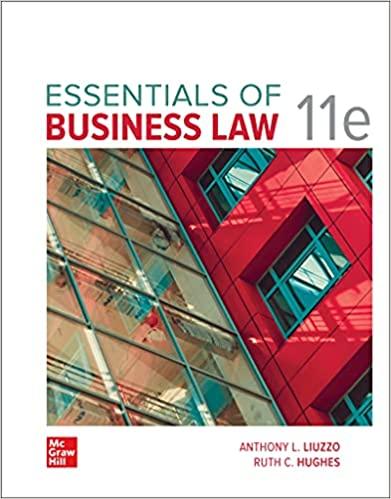1. How would you frame the ethical dilemma/problem faced by Mr. Foster?2. Who are the stakeholders in regard to the decision that must be made by Mr. Foster3. There are some major ethics theories that can help to guide us when faced with an ethical dilemma. Identify by name at least two of those theories and briefly explain how each theory works.4. Apply one of the theories you described in your previous answer to the ethical dilemma faced by Mr. Foster. Consider the ramifications of various actions he might take and decide what action would be the most ethical.
Question Completion Status: Atlantic Widgets, Inc., a publicly traded company that marketed directly to its customers, had invested considerable funds to develop its Sales Division. It seems the company had been having major financial problems, it saw increasing its market share through increased sales as the only viable way to survive. Consequently, it hired and trained ten new sales persons during the last year. The investment paid off very well. After taking into account the cost of training and salaries and benefits for the new sales associates, the company netted a profit of $800,000 as a direct result of the spectacular performance of the new additions to Sales. Based on the success of the recently augmented sales force, Atlantic decided to place a position announcement in the Press of Atlantic City for an additional sales trainee. Bandra Janes, a recently naturalized American citizen from a Middle Eastern country, saw the advertisement and applied for the job, Bandra had graduated from Stockton University with a double concentration in accounting and marketing. Although she had originally worked very successfully in the accounting profession, her real interest was in the field of marketing, particularly in sales. She was delighted when Atlantic called her to arrange for an interview as a sales trainee. Sam Foster, the sales manager with whom she interviewed, was most impressed with her credentials, enthusiasm, personality, and the strong recommendation written by her supervisor at her accounting firm. Mr. Foster decided to make an offer to Bandra to join the sales team and enter the six-month trainee program. She happily accepted and resigned from the accounting firm. Following the completion of her training, Bandra was given a sales position and a client list. Mr. Foster was delighted to have her among his team. Not only had he given her high marks during her training, but he also saw in her the potential to be among his best salespersons. As with all new sales associates, however, she was placed on the sales team for a six-month trial period to see how well she would do. Bandra was primarily expected to make sure her assigned clients' needs were met, that they were happy and continued to order more widgets. Atlantic's corporate culture was very client oriented. "The customer is always right" her trainers frequently told her. In her third month as a sales associate, it became apparent that one of Bandra's most important and lucrative clients was exhibiting signs of trouble. Upon investigation, Mr. Foster learned that the said client was threatening to give its business to one of Atlantic's competitors rather than continue to deal with Bandra. The problem was not that the client felt Bandra was not technically qualified. Rather, the client mentioned that her frequent presence at the client's work site made the primarily male workers uncomfortable. It was obvious that Bandra was a refined person, so the client claimed that Bandra's frequent presence at its site (necessary to properly handle the client) stifled the "salty" language and atmosphere that long existed among the men working there. Moreover, the client indirectly suggested that Bandra's ethnic heritage also made some of its workers resentful because one of the men had lost a parent in the terrorist attacks on September 11, 2001. If Bandra felt there was a problem with this client, she never mentioned it to anyone. However, the client strongly hinted to Mr. Foster that it would take its business elsewhere if she remained on its account. Atlantic could not afford to lose this client without having to terminate a significant number of its personnel. The loss of revenue would simply be too great. Bandra was not made aware of the client's threat. Bandra's probationary period is almost up. How should Mr. Foster proceed







